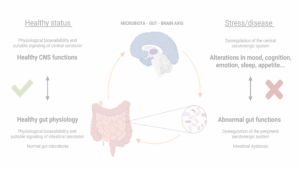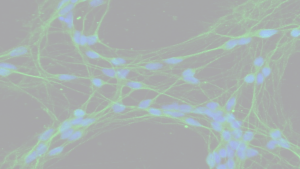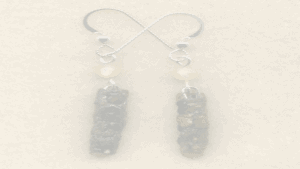Amyotrophic Lateral Sclerosis (ALS) is a devastating disease considered the most common adult onset motor neuronal disorder. Sadly, this disease affects many patients around the world (1 to 3 patients per 100,000 people). These patients develop muscle weakness due to the progressive death of motor neurons (the cells responsible to connect muscles and central nervous system). In addition to the escalating failure of the neuromuscular system, the disease also may alter cognitive function and personality features. All these symptoms finally lead into the paralysis of several systems in the human body and, eventually, to death.
 It is very hard to see how ALS can affect people from young age, typically from 30 or even younger ones. That was exactly the case of Jason Becker, an extraordinary guitarist diagnosed with ALS at the age of 19. He is the main character -or rather the hero- of Jason Becker: not dead yet), the documentary we watched in the III CineScience event held in October 2017 in Sheffield (South Yorkshire) . I use here the word “hero” because he had the proper behaviour of one. To the hard diagnosis, add the lack of information about the disease (in the 90’s). However, despite all the adversities, he found the way to transform his own life as an ALS-patient in a battle to raise awareness about the disease; an absolute triumph.
It is very hard to see how ALS can affect people from young age, typically from 30 or even younger ones. That was exactly the case of Jason Becker, an extraordinary guitarist diagnosed with ALS at the age of 19. He is the main character -or rather the hero- of Jason Becker: not dead yet), the documentary we watched in the III CineScience event held in October 2017 in Sheffield (South Yorkshire) . I use here the word “hero” because he had the proper behaviour of one. To the hard diagnosis, add the lack of information about the disease (in the 90’s). However, despite all the adversities, he found the way to transform his own life as an ALS-patient in a battle to raise awareness about the disease; an absolute triumph.
Nowadays, ALS has become one of the most well-known diseases in the world thanks to the Ice bucket challenge: dumping a bucket of ice and water over a person’s head to promote awareness of ALS disease 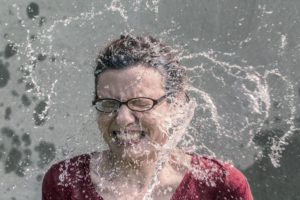 . This idea came to raise research funding in this area. Many scientists all over the world have been strongly involved in ALS studies from different points of view. Researchers as Dr. Laura Ferraiuolo and Dr. Scott Allen, who joined us in a wonderful debate through this session about ALS, explained in detail the new findings that have improved the understanding of this disease as well as new approaches for treatment against it. At the moment, we know that the development of ALS could be linked to mutations in several human genes, like the superoxide dismutase 1 (SOD1)[1][2] and chromosome 9 open reading frame 72 (C9orf72)[3][4]. Both researchers are working on these mutations which appear in sporadic and familial cases of ALS. Independently of the origin of the disease, it seems that the rules controlling its development are similar, involving other types of mutation or even other types of neuronal cells like glial cells (which help to support motor neurons). Although the knowledge about the molecular mechanisms behind ALS has improved during the last years, there is still much more work to do in order to understand about the bricks which build this disease.
. This idea came to raise research funding in this area. Many scientists all over the world have been strongly involved in ALS studies from different points of view. Researchers as Dr. Laura Ferraiuolo and Dr. Scott Allen, who joined us in a wonderful debate through this session about ALS, explained in detail the new findings that have improved the understanding of this disease as well as new approaches for treatment against it. At the moment, we know that the development of ALS could be linked to mutations in several human genes, like the superoxide dismutase 1 (SOD1)[1][2] and chromosome 9 open reading frame 72 (C9orf72)[3][4]. Both researchers are working on these mutations which appear in sporadic and familial cases of ALS. Independently of the origin of the disease, it seems that the rules controlling its development are similar, involving other types of mutation or even other types of neuronal cells like glial cells (which help to support motor neurons). Although the knowledge about the molecular mechanisms behind ALS has improved during the last years, there is still much more work to do in order to understand about the bricks which build this disease.
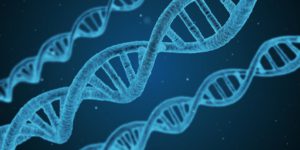 In parallel to this important scientific discoveries, clinical studies regarding the wellbeing of the patients with ALS and other Motor Neuronal Diseases have been developed. Through this documentary, we understood the difficulties to find useful tools to improve the patients’ quality of life. Dr. Esther Hobson, who also took part on this debate, explained the different options available, ranging from symptomatology treatments to therapy, the use of devices to maintain their independence breathing and nutritional support [5][6].
In parallel to this important scientific discoveries, clinical studies regarding the wellbeing of the patients with ALS and other Motor Neuronal Diseases have been developed. Through this documentary, we understood the difficulties to find useful tools to improve the patients’ quality of life. Dr. Esther Hobson, who also took part on this debate, explained the different options available, ranging from symptomatology treatments to therapy, the use of devices to maintain their independence breathing and nutritional support [5][6].
However, we must remember that ALS changes many people’s lives, not only the patients´ but also their families’ and friends’. We just need to see through this documentary, how difficult it is for Jason’s parents and closest friends to see him changing so quickly. But at the same time, it is encouraging how they put an effort on developing new ideas and tools to improve their communication with him. Here is where I would like to highlight how the support for the families is crucial in these cases. Fortunately, many charities all over the world are raising awareness and providing plenty of information for families to find the help they need. Mr. Nick Tyson, who works as an Association Visitor at Motor Neurone Disease Association (MNDa), also brought this point into debate: How families affected by ALS can find the support, help and comprehension on the drastic change in their lives . Mr. Tyson also highlighted the importance of a fluent communication between researchers and patients as the best way to make them understand the basis of the disease they are suffering but also to remind researchers what they are working for so hard.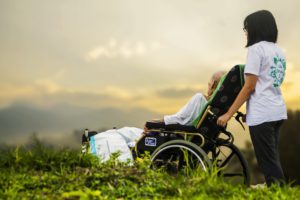
In conclusion, going deeply into Jason Becker’s story, his life and family experience on ALS, and thanks to the wonderful debate built by our panel of experts, we were able to realise that the battle against a disease not only depends on the development of proper scientific studies, but also needs to be supported by the connection in between basic research, clinical studies and society. Throughout a good communication in between these three pillars (Science, Clinical aspects and people) we will raise awareness but also offer ALS patients a better quality of life.
By Dr. Margarita Segovia Roldán. Research Associate at the University of Sheffield. SRUK Yorkshire Constituency
More information:
The Motor Neurone Disease Association (MNDa)
Sheffield Institute for Translational Neuroscience (SITraN)
[1] Allen SP, Rajan S, Duffy L, Mortiboys H, Higginbottom A, Grierson AJ, Shaw PJ.“Superoxide dismutase 1 mutation in a cellular model of amyotrophic lateral sclerosis shifts energy generation from oxidative phosphorylation to glycolysis”. Neurobiolgy of Aging 35(6):1499-509. June, 2014.
[2] Scott P. Allen, Lynn M. Duffy, Pamela J. Shaw & Andrew J. Grierson. “Altered age-related changes in bioenergetic properties and mitochondrial morphology in fibroblasts from sporadic amyotrophic lateral sclerosis patients”. Neurobiology of aging 36 (10): 2893–2903. October, 2015.
[3] Chloe F. Allen, Pamela J. Shaw & Laura Ferraiuolo. ”Can Astrocytes Be a Target for Precision Medicine?” Advances in Experimental Medicine and Biology book series (AEMB) 1007: 111-128. August 25, 2017
[4] Guillaume M. Hautbergue, Lydia M. Castelli, Laura Ferraiuolo et al. “Nature Communications. SRSF1-dependent nuclear export inhibition of C9ORF72 repeat transcripts prevents neurodegeneration and associated motor deficits” Nature Communications 8: May 5, 2017.
[5] Hobson, Esther V, and Christopher J McDermott. “Supportive and Symptomatic Management of Amyotrophic Lateral Sclerosis.” Nature Reviews Neurology12, no. 9 (September 1, 2016): 526–38.
[6] Esther V. Hobson, Saima Fazal, Pamela J Shaw & Christopher J McDermott. “Anything that makes life’s journey better.” Exploring the use of digital technology by people living with motor neurone disease” Amyotrophic Lateral Sclerosis and Frontotemporal Degeneration 18 (5-6) February 20, 2017: 378-387.
Feature Image: by Daniella Sasaki

